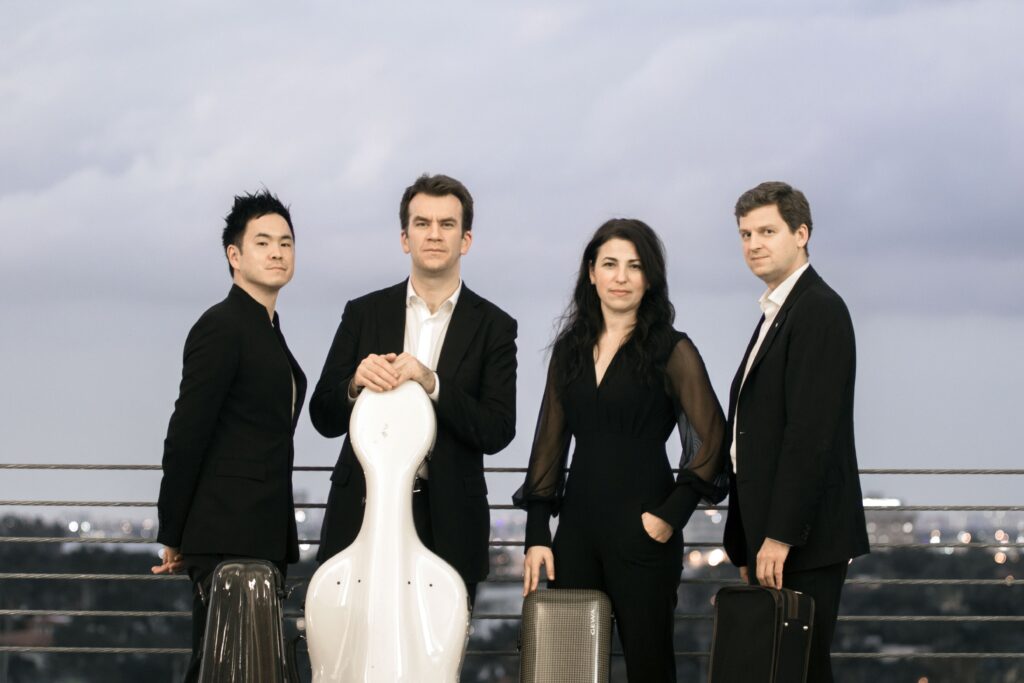Ehnes Quartet returns with vivid and spontanous music-making
After completing their long-running, complete cycle of Beethoven string quartets for Friends of Chamber Music, the Ehnes Quartet has returned to Miami annually with mixed programs of chamber staples and less frequently played repertoire.
James Ehnes and his colleagues again offered a vivid demonstration of flawless ensemble and patrician musicianship Wednesday night at Florida International University’s Wertheim Performing Arts Center with a program of works by Haydn, Bartók and Mendelssohn.
Haydn’s Quartet in F minor, Op. 20, no. 5 was played in classical, idiomatic fashion without the stodginess that can hinder less vital performances. Ehnes was a leader indeed, the Canadian violinist (and Florida resident) providing electricity, lithe phrasing and vibrant intensity. The Menuetto displayed the weight and drama of the score’s minor key with the grace of a courtly dance.
So polished and exquisitely blended were the players’ timbres that the Adagio took on the expressive flow of an operatic aria. Violinist Amy Schwartz Moretti’s sweetness of tone and ensemble skill demonstrated that she was in no way second string to Ehnes. The final fugue emerged intense and driven with fugal lines transparent and a widely terraced dynamic palette. Cellist Edward Arron’s burnished mahogany served as a solid, unifying undercurrent to a reading that brought pulsating life to thrice familiar fare.
Béla Bartók’s Quartet No. 6 in D minor dates from a crucial and fraught time in the composer’s life and creative odyssey. In 1939, the composer’s mother died and World War II had broken out. With the Nazis overrunning Europe, Bartók left Hungary with his family for the United States.
This final major score, written in the homeland he would never see again, rings with the darkness and poignancy of that era. The Ehnes foursome were fully equal to the work’s formidable technical demands. Each of the four movements begins with a slow Mesto introductory section. Violist Che-Yen Chen’s compact sonority launched and shaped the score’s elegiac cast from the first bars. The entry of the other three players was comparable, assayed with high drama and full force.
The solemn second movement Marcia resounded with anger and sardonic pathos. The wrenching Burletta-moderato turns to Hungarian folk ethos with a plucked interlude that the players assayed with verve and devilish irony. The depth of expression and corporate unity of the grim finale capped a reading that fully penetrated the music’s polished surface to reveal its inner tragedy.
Mendelssohn is too often regarded as a creative lightweight. While the romanticism of Mendelssohn’s Quartet in E minor, Op. 44, no. 2 served as an antidote Wednesday night to the modern starkness of Bartók’s opus, the stormy texture and complexity of the quartet’s initial Allegro assai appassionato is worthy of Beethoven. Playing with unison precision, the musicians registered the movement’s impact and turmoil. They ratcheted up an extra degree of tension in the coda. In a typically MendelssohnIan scherzo, every ounce of airy lightness was brought forth.
Ehnes soared over the swaying accompaniment in the Andante’s outpouring of song. The climactic Presto agitato was brisk and relentless with the brief interludes of lyricism a mere respite from the torrential onslaught.
Ehnes and his colleagues evidenced such freshness and spontaneity that it seemed as if they were improvising Mendelssohn’s music in performance. A standing ovation greeted the conclusion of an evening of exceptional music-making.
Friends of Chamber Music presents pianist Simon Tripĉeski 8 p.m. May 2 at Coral Gables Congregational United Church of Christ. The program includes Mozart’s Variations on Salve tu, Domine and 8 Variations in A Major on Come un agnello; Chopin’s Four Mazurkas, Op. 24; Beethoven’s 12 Variations on a Russian Dance and 32 Variations on an Original Theme in C minor; and Prokofiev’s Sonata No. 7. miamichambermusic.org
Posted in Performances
Leave a Comment
Thu Apr 27, 2023
at 12:25 pm
No Comments







